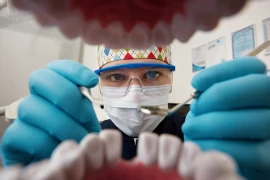
Who Needs Periodontal Treatment?
- Who Needs Periodontal Treatment?
- Those Who Experience Gum Bleeding
- Those with Gum Recession
- Those Suffering from Bad Breath (Halitosis)
- Those Who Feel Tooth Mobility
- Those with Systemic Conditions like Diabetes or Heart Disease
- Pregnant Women
- Smokers
- Orthodontic Patients
- Those with Genetic Predisposition
- Conclusion: Gum Health Is the Guarantee of Your Teeth
As a periodontology specialist, I always emphasize that oral and dental health is not limited to the teeth alone; the supporting tissues around the teeth are equally important. Structures such as the gums (gingiva), alveolar bone, periodontal ligament, and cementum are vital for keeping teeth healthy and stable in the mouth. Infection or damage to these tissues is called “periodontal disease,” and if left untreated, it can lead to serious outcomes such as tooth loss. So, to whom should periodontal therapy be applied, and who is at risk?
Below, based on both scientific data and my clinical observations, I will discuss in detail the situations in which gum treatment is necessary.
Those Who Experience Gum Bleeding
If you notice bleeding gums while brushing or eating, this is most often the first sign of gum inflammation—gingivitis. Early intervention can completely reverse the condition. However, if neglected, the inflammation may advance to the root surface and jawbone, turning into periodontitis. In such cases, simple cleaning won’t suffice; comprehensive periodontal therapy will be required.
Those with Gum Recession
Gum recession causes teeth to appear longer, exposes the root surfaces, and increases sensitivity. This condition—often due to traumatic habits, aggressive brushing techniques, dental crowding, or long-standing inflammation—leads to both aesthetic and functional problems. With periodontal treatment, disease progression can be halted, proper brushing techniques learned, and, if necessary, surgical interventions performed to restore the gum level.
Those Suffering from Bad Breath (Halitosis)
- Chronic bad breath usually stems from bacterial plaque around the teeth and gums or from inflamed tissues. Superficial solutions are not enough; the root cause is often a periodontal infection. Deep cleaning, root planing, and, if needed, antibacterial applications can effectively address this problem.

Those Who Feel Tooth Mobility
- Loose teeth are a clear indicator of advanced damage in the periodontal tissues, especially the surrounding bone. This is commonly observed in patients with progressed periodontitis. Delaying necessary treatments may result in permanent tooth loss. In these cases, beyond initial periodontal therapy, splinting (to stabilize the teeth) and regenerative surgeries to rebuild supporting tissues are required.
Those with Systemic Conditions like Diabetes or Heart Disease
- Periodontal diseases are not just an oral issue. In diabetic patients, infections advance more rapidly. A strong scientific link has also been established between periodontal disease and cardiovascular conditions.
Pregnant Women
- Hormonal changes during pregnancy can exacerbate gum inflammation. It is crucial to have a periodontal examination and treat any existing inflammation before pregnancy. As hormone levels rise, pre-existing gum inflammation can worsen. Individuals in this group should have more frequent periodontal check-ups and personalized treatment plans.
Smokers
Smoking constricts blood vessels in the mouth, masking gum bleeding. This creates a silent environment in which periodontitis can progress unnoticed. Smoking also suppresses the immune system, slowing the healing process. For smokers, diagnosis and treatment are more complex, making regular follow‑up essential.
Orthodontic Patients
- Individuals wearing braces (brackets) find it harder to maintain oral hygiene. Plaque accumulates more easily, increasing the risk of gum inflammation. The success of orthodontic treatment depends on healthy gums. Therefore, regular professional cleanings and, if necessary, periodontal interventions are crucial.
Those with Genetic Predisposition
- Some individuals develop aggressive periodontal problems early in life despite good oral hygiene. If there is a family history of early tooth loss, genetic susceptibility may be at play. These individuals should be evaluated by a periodontology specialist at an early age.
Conclusion: Gum Health Is the Guarantee of Your Teeth
Periodontal therapy is important not only for treating existing diseases but also as part of a preventive oral health approach. Since periodontal diseases often progress painlessly and go unnoticed until advanced stages, regular check‑ups and early diagnosis are indispensable for keeping your teeth healthy throughout your life.
Remember:
👉 “Take care of your gums before you lose your teeth.”
Don’t hesitate to seek specialist advice at the first sign of any change in your mouth. Healthy gums are the key to a healthy life.

Prof. Dr. Elif Eser ACAREL
Periodontology Specialist





